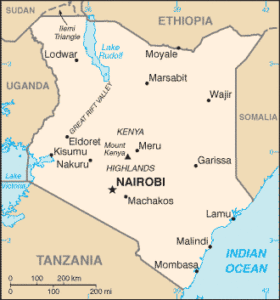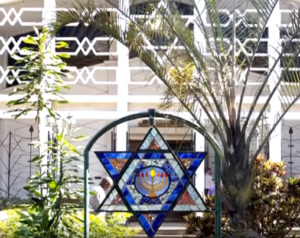 Jews have lived in what is present-day Kenya since the turn of the 19th century. Almost entirely situated in Nairobi, Jewish life in Kenya slowly began to grow, with the Nairobi Hebrew Congregation established in 1904. J. Marcus, a Jewish businessman, moved to Nairobi from India in 1899 and established an export business for local produce. A Jewish cemetery was consecrated in 1907, and the first synagogue in 1913. In the aftermath of the Holocaust, Kenya saw a sizeable influx of Jewish immigration. By 1913, 20 Jewish families had settled in Nairobi. During the period of World War II and following the Holocaust, Jewish immigration increased and as many as 1,200 Jews were living in the Kenya.
Jews have lived in what is present-day Kenya since the turn of the 19th century. Almost entirely situated in Nairobi, Jewish life in Kenya slowly began to grow, with the Nairobi Hebrew Congregation established in 1904. J. Marcus, a Jewish businessman, moved to Nairobi from India in 1899 and established an export business for local produce. A Jewish cemetery was consecrated in 1907, and the first synagogue in 1913. In the aftermath of the Holocaust, Kenya saw a sizeable influx of Jewish immigration. By 1913, 20 Jewish families had settled in Nairobi. During the period of World War II and following the Holocaust, Jewish immigration increased and as many as 1,200 Jews were living in the Kenya.
When the British set up detention camps in Gilgil (northeast of Nairobi) for members of the I.Z.L. (Irgun) and Lehi Jewish underground organizations deported from Palestine in 1947, the Kenyan Jewish community worked diligently to improve their living conditions. A large number of Jews left Kenya in droves after the creation of the State of Israel in 1948 and the overall Jewish population fell when Kenya got her independence.
 In 1991, the synagogue (congregation) numbered approximately 165 families with a membership of 500. In 2011, approximately eight per cent of Nairobi’s expat Jewish community was estimated to be Israeli. Today, approximately 300 affiliated Jews live in Kenya; most reside in Nairobi and most of the others in Mombasa. However, it is estimated that overall, there are approximately 1,000 Jews in Kenya. There are regular Shabbat and holiday services held in the only synagogue in the country. While the majority of the congregation is not Orthodox, the services follow Orthodox traditions, including separate seating for men and women.
In 1991, the synagogue (congregation) numbered approximately 165 families with a membership of 500. In 2011, approximately eight per cent of Nairobi’s expat Jewish community was estimated to be Israeli. Today, approximately 300 affiliated Jews live in Kenya; most reside in Nairobi and most of the others in Mombasa. However, it is estimated that overall, there are approximately 1,000 Jews in Kenya. There are regular Shabbat and holiday services held in the only synagogue in the country. While the majority of the congregation is not Orthodox, the services follow Orthodox traditions, including separate seating for men and women.
A Kikuyu-speaking Kasuku community of 60 members, calling itself the Kasuku Gathundia Jewish community, has developed among subsistence farmers in the Kenyan highlands. Kenya is home to the second-largest sub-Saharan Jewish community, with some 600 in the capital, Nairobi, and another hundred in Mombasa. The community was fully functioning, despite not having a rabbi.